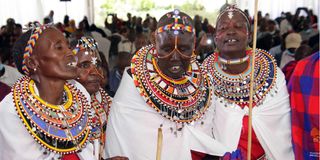Pastoralists fault East Africa govts over slow land reforms

Twala women from Laikipia Noth entertain guests during the second East Africa Indigenous People's Land Summit at Sportsman Arms Hotel in aikipia County on November 22, 2022.
Pastoralist communities across East Africa have faulted their respective governments over the slow pace of implementing land reforms, saying this has undermined their livelihoods as the climate change crisis worsens.
Speaking during the East Africa Indigenous Peoples’ Land Summit in Nanyuki, Laikipia County, representatives from seven countries said that though land reforms were initiated, there was outright lack of political goodwill.
For instance, in Kenya, Uganda and Tanzania, the process of community land registration has been bogged down by a myriad of challenges that the governments don’t seem interested in addressing.
Registration of communal land is meant to empower pastoral communities in managing natural resources, tap investment opportunities and get compensation when governments compulsorily acquire land for mega projects.
The summit, whose theme was “Amplifying Collective Voices of Indigenous Peoples’ through Inclusive Dialogues and Learning to Enhance Land Rights for Livelihoods and Conservation in East Africa”, wants to identify land-related challenges and lobby continental bodies like the African Union for desirable land reforms
It has attracted representatives of nomadic herders, agro-pastoralists, hunter-gatherers and fisherfolk from Kenya, Tanzania, Uganda, Ethiopia, Rwanda, Burundi and the Democratic Republic of Congo (DRC).

Delegates follow proceedings during the second East Africa Indigenous People's Land Summit at Sportsman Arms Hotel in aikipia County on November 22, 2022.
The four-day summit was organised by the Kenya civil society organisation IMPACT, which invited representatives from the ministries of Lands, and Environment and Forestry, the National Land Commission (NLC), the African Union, development partners, civil society groups and officials of county governments.
In his keynote address, NLC chairman Garshon Otachi said the commission is dealing with hundreds of claims related to land injustices.
“[The] NLC is sorting more than 3,000 historical land injustice claims it received from Kenyans. A good percentage of these claims emanate from what we can describe as indigenous populations,” Mr Otachi said.
He said most of the communities, mainly from arid and semi-arid areas, have not benefited from the Community Land Registration Act 2016, which was enacted to give legal ownership to communities whose land had for years been held in trust by the government.
“Only about 10 percent of communal land has been registered under the new Act six years down the line. The enactment of the 2016 Land Act was a game-changer as it offered a pathway for the management and governance of customary and indigenous land in Kenya,” he said.
Gemechu Berhanu, a representative from the Oromo community in Ethiopia, said the process of registering communal land, which started in 2021, is extremely slow and people are using them for private purposes without consulting the community.

National Land Commission chairman Gershom Otachi gives a keynote address during the second East Africa Indigenous People's Land Summit at Sportsman Arms Hotel in aikipia County on November 22, 2022.
“Most pastoral lands are not registered, though there is a legislation clause, and are communally owned like most others in the East African region. That makes it difficult for the pastoral community to use the land effectively,” said Mr Berhanu, the executive director of the Oromia Pastoralists Association.
Ms Elizabeth Katushabe, a representative from Uganda, told the summit that pastoralists, including the nomadic Karamojong, were being displaced from their ancestral land by the government in an effort to force them to adopt modern agriculture on communal lands that are not officially registered.
“We are challenged by perennial drought and we cannot run to other areas, because there are restrictions. The government has introduced a programme of settling pastoralists and encouraging them to keep exotic cattle breeds that can hardly survive due to the harsh environment in these semi-arid areas,” Ms Katushabe said.
The hunter-gatherer Batwa community from Burundi and DRC accused their respective governments of kicking them out of their ancestral forests without giving them alternative land.
“We are a population of about 117,000 and traditionally we used to eke out a living hunting animals, gathering honey and wild fruits and molding pots,” Gervais Ndihokubwayo said.
“Since our fathers were kicked out of the forest, we are no longer able to access clay, which is the raw material for molding pots.”
On Thursday, the delegates are expected to come up with resolutions aimed at fast-tracking land reforms that guarantee sustainable livelihoods and protect the rights of indigenous communities to land and natural resources.




